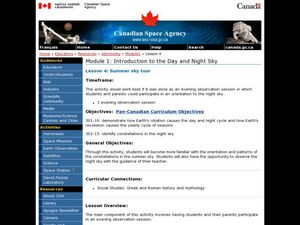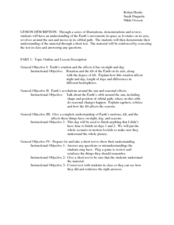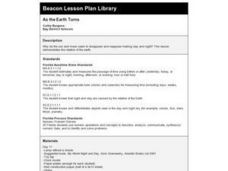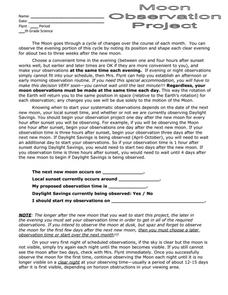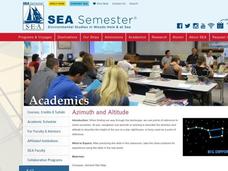Science 4 Inquiry
Phases of the Moon
The moon takes just over 27 days to orbit around Earth. Young scientists position themselves as the earth as they rotate around the sun and hold the moon. This allows them to observe the patterns and phases of the moon.
NorthEast Ohio Geoscience Education Outreach
Earth, Sun and You
Middle schoolers model Earth's revolution round the sun by walking a mini-globe around a lamp. You will assess whether or not they tilt and rotate the planet properly and that the revolution is counterclockwise. Discussion beforehand...
Curated OER
Science: Day and Night
Students listen to the Sky Tellers Native American story, "Ant Dances for Light," and illustrate it. They observe how Earth's rotation results in periods of darkness and light. Students investigate how day length varies throughout the...
Curated OER
Reasons for the Seasons
Students discover how the Earth's axis of rotation affects the angle of sunlight and the length of day. They take a survey and give the survey out to family members and friends. They tally their findings and then determine the correct...
Curated OER
Planet Earth
In this Earth learning exercise, students review the characteristics of the Earth including it's rotation and revolution. This learning exercise has 9 fill in the blank and 7 short answer questions.
Curated OER
Summer Sky Tour
Students explore space science by participating in a constellation identification activity. In this astronomy lesson, students view star charts based on the different seasons and define a list of astronomy related terms. Students...
Curated OER
Movement of Air II
In this movement of air instructional activity, students determine the deflection of air masses that result from Earth's eastward rotation. Then they describe what winds provide for different trades. Students also identify and describe...
Curated OER
Earth's Movement in Space
Students explain how the Earth's tilt and rotation causes night and day. In this earth science lesson, students determine how seasonal changes are caused by Earth's revolution. They play a jeopardy team game at the end of the unit to...
Curated OER
Models of the Earth and Moon
Students explore the earth's rotation and phases of the moon. In this planets lesson plan, students rotate and revolve around a light representing the sun. Students use movement and props to simulate what causes the phases of the moon as...
Curated OER
Exploration of the Moon
In this moon activity, students will use a table with facts about the moon to answer questions about the moon's rotation, distance from the Earth, gravity, and temperature. Students will complete 9 short answer questions.
Curated OER
Seasons
Students investigate the reason for seasons on Earth during three activities. They construct a model of the Earth and Sun to identify patterns in the changes of the angle of light on the Earth's surface. Then they conduct a heat...
Curated OER
Exploring the Night Sky: Fall/Winter
Students explain how moon phases occur. They explain three ways that the night sky has been used through history. Students locate some of the constellations in the night sky. They discuss stories and myths surrounding stars.
Curated OER
Moon Phases, Day/Night
Fifth graders observe a demonstration that shows how the alignment of the sun, moon, earth relate to the phases of the moon that occur each month. They describe the moon's phases after experimenting in a small group setting and recording...
Curated OER
Earth's Place in Space
In this Earth instructional activity, students review how the revolution, rotation, and tilt of the Earth effects the Earth. This instructional activity has 4 matching and 3 short answer questions.
Curated OER
As the Earth Turns
First graders explore why the sun and moon seems to disappear and reappear creating day and night.
Curated OER
Bill Nye Video: Earth's Seasons
For this earth's seasons worksheet, students answer fill in the blank questions after seeing Bill Nye's video. Topics include the rotation of the earth around the sun, the tilt of the earth, the time zones and sunlight.
Curated OER
The Solar System
Students describe the different bodies that make up our solar system, explain the place of our solar system within the Milky Way Galaxy and the universe, explain day and night and the Earth's movement, and describe the relationship...
School World
Moon Observation Project
Mrs. Flynt has designed a 12-day moon observation activity that is best assigned when daylight hours are shorter. Middle school moon experts record several factors, including the altitude above the horizon, the azimuth, the phase, and...
World Wildlife Fund
Land of the Midnight Sun
From days of 24 hour sunlight, to endless nights that last for days, the Arctic is a very unique place to live. Examine the seasonal changes that occur in the northern-most reaches of the globe and the impact they have on the plants and...
Curated OER
Azimuth and Altitude
Learners use a compass and their hands to find positions of stars and planets in the night sky or of the sun during the day.
Curated OER
Moon Shadows
In this moon shadows worksheet, 3rd graders follow the directions to set up a demonstration about the sun, the earth and the moon.
Curated OER
Seasons of the Year
Young scholars examine how the link between the tilt of the Earth's axis to the ecliptic and seasons of the year--length of day, effectiveness of sunlight, polar day and night, and seasons south and north of the equator, as well as near it.
Curated OER
Lunar Lollipops
Students simulate the phases of the moon using a lamp and styrofoam balls. In this lunar phases lesson, students stand around a lamp and act as Earth. They hold styrofoam balls and rotate to show the phases of the moon.








